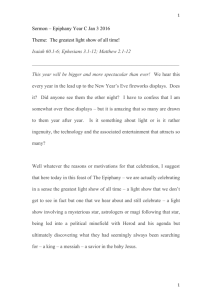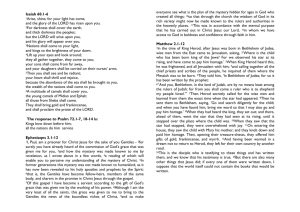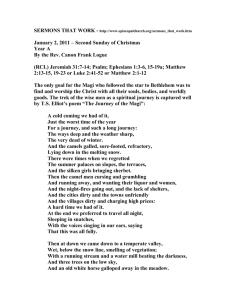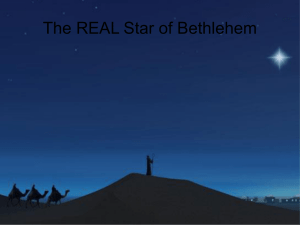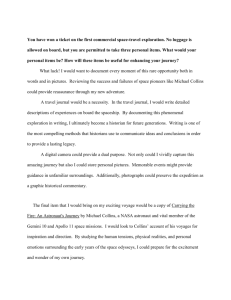SERMON 15-01-04 Matthew 2.1-12
advertisement
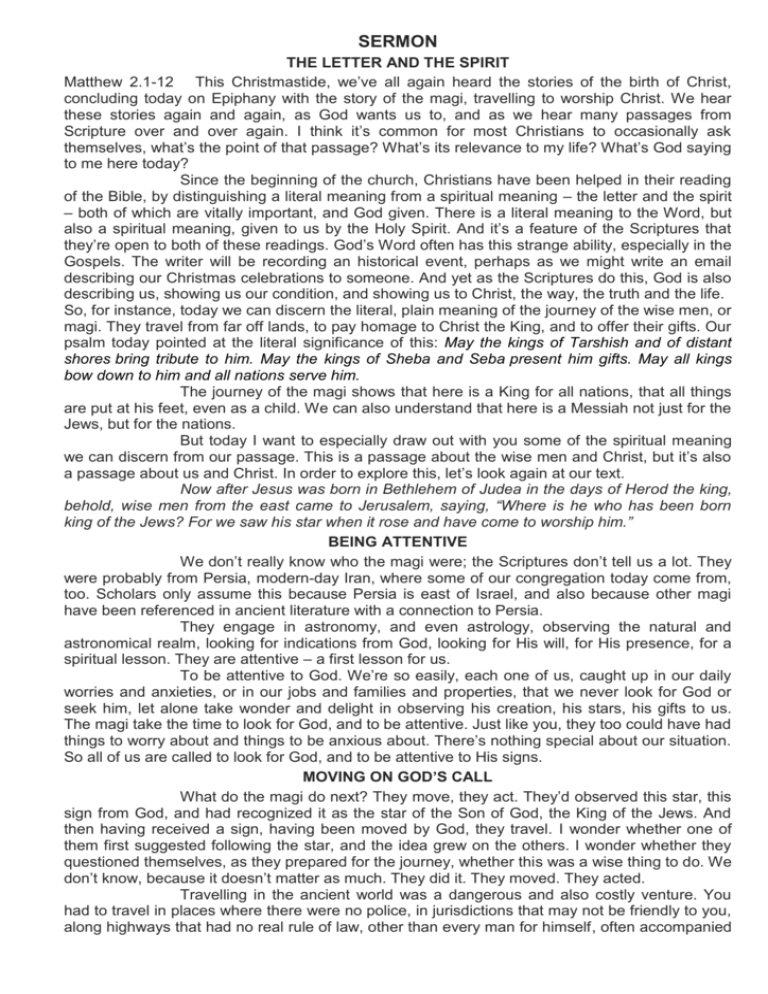
SERMON THE LETTER AND THE SPIRIT Matthew 2.1-12 This Christmastide, we’ve all again heard the stories of the birth of Christ, concluding today on Epiphany with the story of the magi, travelling to worship Christ. We hear these stories again and again, as God wants us to, and as we hear many passages from Scripture over and over again. I think it’s common for most Christians to occasionally ask themselves, what’s the point of that passage? What’s its relevance to my life? What’s God saying to me here today? Since the beginning of the church, Christians have been helped in their reading of the Bible, by distinguishing a literal meaning from a spiritual meaning – the letter and the spirit – both of which are vitally important, and God given. There is a literal meaning to the Word, but also a spiritual meaning, given to us by the Holy Spirit. And it’s a feature of the Scriptures that they’re open to both of these readings. God’s Word often has this strange ability, especially in the Gospels. The writer will be recording an historical event, perhaps as we might write an email describing our Christmas celebrations to someone. And yet as the Scriptures do this, God is also describing us, showing us our condition, and showing us to Christ, the way, the truth and the life. So, for instance, today we can discern the literal, plain meaning of the journey of the wise men, or magi. They travel from far off lands, to pay homage to Christ the King, and to offer their gifts. Our psalm today pointed at the literal significance of this: May the kings of Tarshish and of distant shores bring tribute to him. May the kings of Sheba and Seba present him gifts. May all kings bow down to him and all nations serve him. The journey of the magi shows that here is a King for all nations, that all things are put at his feet, even as a child. We can also understand that here is a Messiah not just for the Jews, but for the nations. But today I want to especially draw out with you some of the spiritual meaning we can discern from our passage. This is a passage about the wise men and Christ, but it’s also a passage about us and Christ. In order to explore this, let’s look again at our text. Now after Jesus was born in Bethlehem of Judea in the days of Herod the king, behold, wise men from the east came to Jerusalem, saying, “Where is he who has been born king of the Jews? For we saw his star when it rose and have come to worship him.” BEING ATTENTIVE We don’t really know who the magi were; the Scriptures don’t tell us a lot. They were probably from Persia, modern-day Iran, where some of our congregation today come from, too. Scholars only assume this because Persia is east of Israel, and also because other magi have been referenced in ancient literature with a connection to Persia. They engage in astronomy, and even astrology, observing the natural and astronomical realm, looking for indications from God, looking for His will, for His presence, for a spiritual lesson. They are attentive – a first lesson for us. To be attentive to God. We’re so easily, each one of us, caught up in our daily worries and anxieties, or in our jobs and families and properties, that we never look for God or seek him, let alone take wonder and delight in observing his creation, his stars, his gifts to us. The magi take the time to look for God, and to be attentive. Just like you, they too could have had things to worry about and things to be anxious about. There’s nothing special about our situation. So all of us are called to look for God, and to be attentive to His signs. MOVING ON GOD’S CALL What do the magi do next? They move, they act. They’d observed this star, this sign from God, and had recognized it as the star of the Son of God, the King of the Jews. And then having received a sign, having been moved by God, they travel. I wonder whether one of them first suggested following the star, and the idea grew on the others. I wonder whether they questioned themselves, as they prepared for the journey, whether this was a wise thing to do. We don’t know, because it doesn’t matter as much. They did it. They moved. They acted. Travelling in the ancient world was a dangerous and also costly venture. You had to travel in places where there were no police, in jurisdictions that may not be friendly to you, along highways that had no real rule of law, other than every man for himself, often accompanied by wild animals for which travellers carried staffs to fend them off. And journeys weren’t quick. Even if the magi had enough money for camels, and we don’t know if they did, it was still an arduous journey – dust, rain, sleeping outdoors – great discomfort. But they were willing to do it, because they’d seen the sign. What’s our lesson? When you hear God encouraging you in a direction, when you feel called to do something, when you see God’s sign – do it. Move. Act. Give. Make the phone call. Take the journey. God’s call to us is not just to talk the talk, but walk the walk. I read recently that we often judge other people by their actions, but judge ourselves by our intentions. But the magi’s intentions aren’t enough – they act, they move, as we should too. You may be able to remember now, times when you felt God’s call to a particular course of action, but didn’t do it. Perhaps you’ve made a habit of this so much that you try to ignore God’s calling altogether. Today God’s forgiveness is for you, to take away your guilt by the blood of Christ. And the magi then teach us to wake up from our complacency, and to move – even if at great discomfort. ADVICE So they travel to Jerusalem and seek out King Herod for his advice. Herod points them in the right direction, and yet he has a murderous intent. He asks the magi to return when they have found Jesus, so that Herod too can worship. But his intent is to kill Jesus, to kill this rival to the throne. What lesson can we learn here? That we can expect persecution, opposition, and even trickery when we walk the path of God. We heard this last Sunday from St Peter: Beloved, do not be surprised at the fiery trial when it comes upon you to test you, as though something strange were happening to you. What’s interesting about this trial is that Herod plays nice. He’s subtle. He tries to take advantage of the magi, to manipulate them. Our trials can come to us subtly as well, under the cover of what appears to be nice. Remember Jesus’ words: Be as wise as serpents and as innocent as doves. If we don’t expect trials on our journey, or even trickery, we can remain innocent as doves, but without the wisdom we need. STAR Upon leaving Herod, they come to the house in Bethlehem, where the star comes to rest on the Holy Family. And despite their evident surprise at the lowliness of this tiny place, they prostrate themselves, bowing down before this little child. He doesn’t look like a King, but they can see it. And so they lay down their gifts before him – gold because He is a King, frankincense because He is our high priest, and myrrh, the spice for burying people, to point towards Christ’s own death for us. They open their coffers, and give of the King their best. What’s the lesson for our spiritual journey? We’ve heard the call, seen the sign, we’ve moved and walked the journey, navigating trials. We’ve come to Christ, but can sometimes draw back from giving our best to Christ, from giving him our riches. And so we need to ask ourselves sometimes. To whom am I giving my best? Myself, my job, my family? Like the magi, Jesus calls us to love the Lord your God with all your heart, soul, mind and strength. Your best. We can even think of the magi devoting their astronomical skills, and their intellect, to looking for God’s signs. They give him their best, and we should too, because He has given His best to you. CONCLUSION The magi were on a literal journey, and yet we are all on a spiritual journey. It’s not necessarily a journey of discovery, but a journey of receiving. Because the Best has been given to us, God’s grace has been discovered and found in Christ crucified and risen, and its ours to appropriate, to receive, to be converted by more and more. We don’t have to travel hundreds of kilometres like the magi to find God’s love, or God’s call, or God’s presence. It’s right here! Instead our journey is to receive more and more of God’s presence in our lives. To be awake to His creation and His signs, to act in love as He has acted in love to you, to withstand trials, and to bring our best before God. May the Holy Spirit encourage you in this striving for holiness, even as Christ has already by His precious blood, removed your guilt and made you holy. Preached on Epiphany, 4 January 2015 at St Paul’s Lutheran Church, Grovedale, by Pastor Tom Pietsch.
